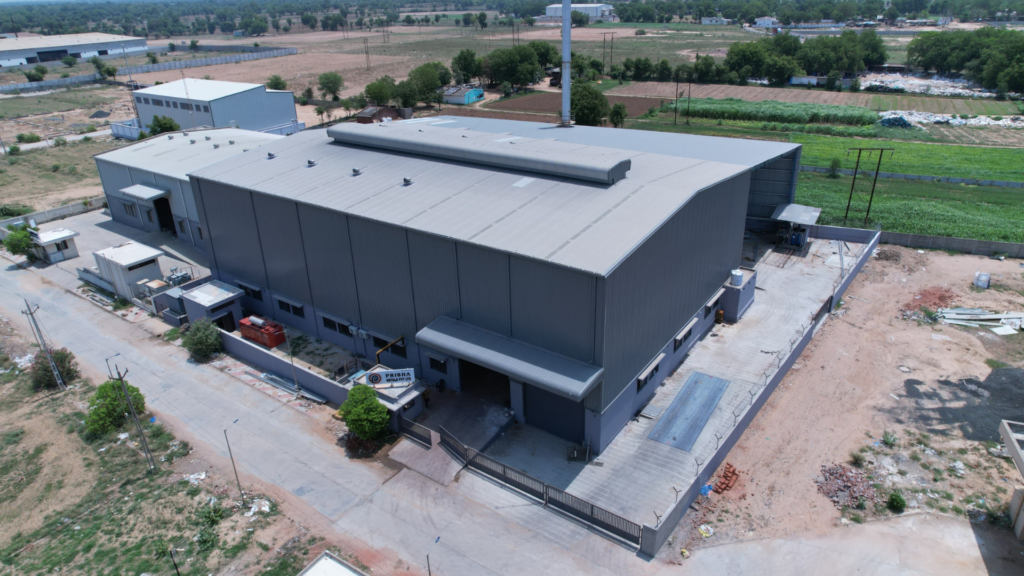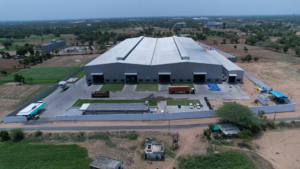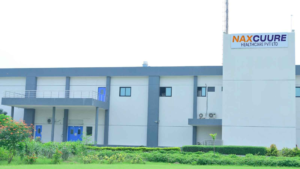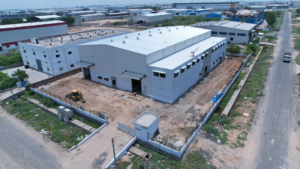Project Overview
Dhanvi Infracon Pvt. Ltd. undertook the complete construction of Prisha Metal, a pioneering manufacturer of aluminum sublimation sheets based in Chhatral, Gujarat. The facility is designed to support large-scale production of metal sheets used extensively in architectural, interior, and digital printing applications. As sublimation is still a novel technique in construction-related design, the project required cutting-edge infrastructural planning, future-ready installation spaces, and high-precision construction. This project showcases how Dhanvi Infracon integrates industrial needs with modern construction trends to enable new-age manufacturing units.
Features of the Project
- State-of-the-Art Industrial Facility: Spread across a vast built-up area tailored to aluminum sublimation sheet manufacturing.
- Advanced Machinery Installations: Space planning for sublimation machines, cooling systems, and large-format printers.
- Eco-Efficient Infrastructure: Ventilation systems, rainwater harvesting setup, and natural lighting for reduced carbon footprint.
- Heavy Load Flooring: Reinforced RCC floors designed for high-weight machinery and material movement.
- Fire & Safety Compliance: Full installation of fire alarms, hydrants, and exit safety structures.
- Raw Material & Finished Goods Zones: Separate designated storage zones with forklift-accessible pathways.
- Office & Research Block: Corporate and R&D spaces constructed with premium interiors and IT infrastructure.
- Energy Management System: Centralized energy control with provisions for solar installation in the future.
Technologies Used
- BIM (Building Information Modeling) – for digital construction simulation.
- Precast RCC Components – ensured faster and uniform quality structure build.
- Puff Panel Installation – for temperature control in printing environments.
- Epoxy & Anti-Static Flooring – for smooth sheet handling and safe operations.
- Smart Electrical Systems – advanced wiring and lighting panels for operational efficiency.
- Dust & Air Quality Management Systems – integrated into ducting and roofing design.
- IoT-based Monitoring – temperature, lighting, and machinery zones managed via IoT systems.
- AI-enabled Security – face detection, motion sensors, and perimeter safety controls.
Challenges Faced During Construction
- Humidity Control Requirements
Sublimation processes are sensitive to moisture; managing the internal climate during construction was challenging. - Precision Zoning for Layout
Required precise space planning for sublimation lines and workflow from raw to finished goods. - Heavy Equipment Foundation
Needed specially engineered foundations for vibration-free machine operation. - Short Timelines
The client wanted operational readiness within six months, which required day-and-night shift work. - Custom Material Use
Fire-retardant claddings and sublimation-safe paint finishes had to be sourced and applied with care. - Logistics of Installation
Managing the logistics of sublimation machine placement and wiring integration was complex. - Design Adjustments
Several mid-way changes based on supplier suggestions had to be incorporated without impacting deadlines.
Advantages of the Project
- Tailored for the Sublimation Industry – specialized construction enables optimal workflow.
- Energy Efficient Design – future-ready for solar and energy-saving systems.
- Advanced Safety Standards – international-grade fire, air, and structural safety.
- Client-Centric Flexibility – infrastructure that can be expanded or reconfigured.
- Aesthetic and Functional – blends industrial robustness with premium corporate space.
Disadvantages & Limitations
- High Initial Construction Cost due to technology integration and premium features.
- Specialized Maintenance for humidity, safety, and air handling systems.
- Training Needs for operating staff to manage advanced facilities.
- Limited Vendor Availability for niche materials like anti-static epoxy, puff panels.
- Dependency on Specific Power Loads for sublimation printing equipment.


Future Plans
- Expansion of Manufacturing Bay: Adding a second phase to expand production by 40%.
- Green Certifications: Plan to register for IGBC or LEED green building ratings.
- Automated Logistics: Incorporate AGVs (Automated Guided Vehicles) for raw material movement.
- AI-Powered Inventory & QC: Use AI for managing product quality and warehouse stock.
- Solar Panel Installation: Roofs pre-engineered for solar panel integration.
- R&D Wing for Innovation: Plan to develop new sublimation finishes and coatings.
- Global Distribution Readiness: Develop export-handling units with climate-controlled loading zones.
- Digital Twin: Use digital twin technology for maintenance and energy tracking.
Conclusion
The Prisha Metal Project by Dhanvi Infracon Pvt. Ltd. stands as a benchmark in modern manufacturing infrastructure, especially for the evolving sublimation sheet industry. Through meticulous planning, advanced construction methods, and a forward-looking approach, Dhanvi delivered a fully optimized industrial facility tailored to the exacting standards of Prisha Metal. Despite the complexities and innovations involved, the project was completed efficiently and now serves as a model for similar future builds in the metal and printing space. It reaffirms Dhanvi Infracon’s position as a leader in industrial construction excellence.





